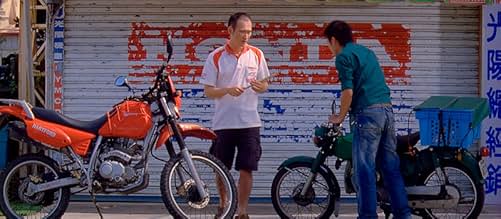IMDb RATING
7.0/10
4.6K
YOUR RATING
A unusual group of people in a village on the coast of Taiwan form a band to perform at a beach concert, while the lead singer searches for the intended recipient of 7 lost love letters.A unusual group of people in a village on the coast of Taiwan form a band to perform at a beach concert, while the lead singer searches for the intended recipient of 7 lost love letters.A unusual group of people in a village on the coast of Taiwan form a band to perform at a beach concert, while the lead singer searches for the intended recipient of 7 lost love letters.
- Awards
- 11 wins & 9 nominations total
Wei-min Ying
- Frog
- (as Wei-Min Ying)
Johnny Chung-Jen Lin
- Old Mao
- (as Johnny C.J. Lin)
Joanne Yang
- Dada
- (as Joanne)
Hsin-Yan Chang
- Meilin - The Hotel Receptionist
- (as Chin-Yen Chang)
- Director
- Writer
- All cast & crew
- Production, box office & more at IMDbPro
7.04.6K
1
2
3
4
5
6
7
8
9
10
Featured reviews
A real Taiwan; a beautiful Taiwan.
The title is what I believe after I saw this movie.
Cape No.7 is a great movie and a humble self-introduction of Taiwan. Few that live in mainland China know the real Taiwan. What are the people like? How is their life there? These questions are not merely out of our curiosity; it's more because we care.
Movie has always been a good way of knowing other peoples and cultures. I've always been wanting to know Taiwan through their movies, but the fact is movie industry of Taiwan hasn't been doing well for a long time. If you go to a DVD shop(not to mention cinema) and look for Taiwan movies, mostly, you'll find, or the owner will recommend to you stupid little romances with good-looking faces or extremely low-key boring meaningless experiments(usually in experiments' disguise making erotic stuff), but what we wanna see and the filmmakers in Taiwan should show us is a real Taiwan, a real life of the people. Unlike most other Taiwan movies you can easily find, Cape No.7 is not only a 100% percent authentic Taiwan movie, encouragingly, it's honest and humble too, in order that a real Taiwan will be demonstrated to everyone, including Taiwan natives.
And the effort paid off. We see the beauty of the island, and the beauty of its people. You may think of another movie that is like a place's self-introduction, The Barber of Siberia. Critics say Russia in The Barber of Siberia is not the real Russia, which is not that good in fact. You might feel Taiwan in Cape No.7 is not the real Taiwan either; you might think Taiwan could never be such a nice place. Truthfully, Taiwan has its good and bad things, if there is nothing good in Taiwan and the movie tells you it's good then that's called fake; if there are good things and people, and the movie shows the good to us, why should we say it's not real? There is a time to reveal bad and ugly and there is a time to show good and beauty. Same reasoning with The Barber of Siberia. At this moment, why don't we enjoy seeing a good, beautiful and true Taiwan and hope there are more and more movies like Cape No.7.
Cape No.7 is a great movie and a humble self-introduction of Taiwan. Few that live in mainland China know the real Taiwan. What are the people like? How is their life there? These questions are not merely out of our curiosity; it's more because we care.
Movie has always been a good way of knowing other peoples and cultures. I've always been wanting to know Taiwan through their movies, but the fact is movie industry of Taiwan hasn't been doing well for a long time. If you go to a DVD shop(not to mention cinema) and look for Taiwan movies, mostly, you'll find, or the owner will recommend to you stupid little romances with good-looking faces or extremely low-key boring meaningless experiments(usually in experiments' disguise making erotic stuff), but what we wanna see and the filmmakers in Taiwan should show us is a real Taiwan, a real life of the people. Unlike most other Taiwan movies you can easily find, Cape No.7 is not only a 100% percent authentic Taiwan movie, encouragingly, it's honest and humble too, in order that a real Taiwan will be demonstrated to everyone, including Taiwan natives.
And the effort paid off. We see the beauty of the island, and the beauty of its people. You may think of another movie that is like a place's self-introduction, The Barber of Siberia. Critics say Russia in The Barber of Siberia is not the real Russia, which is not that good in fact. You might feel Taiwan in Cape No.7 is not the real Taiwan either; you might think Taiwan could never be such a nice place. Truthfully, Taiwan has its good and bad things, if there is nothing good in Taiwan and the movie tells you it's good then that's called fake; if there are good things and people, and the movie shows the good to us, why should we say it's not real? There is a time to reveal bad and ugly and there is a time to show good and beauty. Same reasoning with The Barber of Siberia. At this moment, why don't we enjoy seeing a good, beautiful and true Taiwan and hope there are more and more movies like Cape No.7.
Taiwan Comes of Age
For those viewers who are rusty on their Taiwanese history, Cape No. 7 is a good time, a sweet if somewhat angsty love story, and an intriguing glimpse into the day-to-day life of a Taiwanese town. For those who do know something of Taiwan's history and present international deadlock, the film becomes a vocal assertion of selfhood.
The amorous tension in the film is between a local Taiwanese boy, Aga, and a Japanese model, Tomoko. Aga has returned home to his small seaside village moody and gruff after failing to make it as a musician in Taipei, while Tomoko, trying to organize a Japanese pop star's concert at a nearby resort, has been tasked with finding locals good enough to form the opening band. A sweet if somewhat skimmed-over subplot involves a failed romance set during the aftermath of Japan's occupation of Taiwan in World War II, in which a young Japanese teacher writes letters to his Taiwanese beloved as he sails home to Japan. Sixty years later, these letters now find their way into the hands of Aga and Tomoko, who determine to discover their owner.
Both love stories reflect aspects of Taiwan's relationship with Japan at different times in its history. The Japanese teacher deserted his Taiwanese beloved, much as the Japanese deserted Taiwan after the war, turning over the reigns of their repressive but adept rule to the even more iron-fisted Chiang Kai-shek. During colonization, Japanese cultural systems were forcibly enforced on the island; under Chiang's rule, Chinese culture was dominant. In both cases, local Taiwanese culture was considered second-best. The movie addresses these issues of abandonment and desire for equality. Aga yearns for recognition of his talent, which he finally gets when Tomoko confesses her love and when his music – specifically a traditional Taiwanese ballad - is embraced both by the local villagers and, more importantly, by the Japanese pop star, who says he "knows the song." By winning the love of Tomoko and the acknowledgement of the Japanese pop star, Aga – and Taiwan – claim equal footing at last.
The film can also be seen in light of Taiwan's current condition as a pariah in international relations. As a country formally recognized by only 23 states, most of them small islands in the Pacific, Taiwan has fought tooth and nail for just minimal acknowledgement from the world community. (This year's small victory as an observer in the World Health Assembly, which as part of the United Nations has traditionally refused to recognize Taiwan, is one such example.) Taiwan's lack of global recognition is due in a large part to the influence of China, which sees Taiwan as part of its territory. Tellingly, Cape No. 7 makes no mention of China or the Chinese influence on the island; most of the dialogue is in Taiwanese, Japanese, or Taiwan guoyu (Taiwanese Mandarin). Mandarin Chinese, the official language of China, becomes the compromise language between Tomoko and the Taiwanese villagers – she snaps at them, "I can't understand your Taiwanese accent!" and they make fun of her, saying, "Who can understand her Chinese?" Mandarin, although a necessary tool for communicating, is a foreign tongue for all of them, which illustrates the ambivalent position of China in the world of the film. In real life, ties between Taiwan and its Mainland neighbor have thawed rapidly; the two now permit direct flights, the first in sixty years, and economic relations grow closer with each dip of the stock market. China's marginalization in the film, however, consciously disregards that part of Taiwan's complicated present to explore other aspects of Taiwanese identity – perhaps a way of fighting back against the influence the PRC has increasingly tried to cast over the island.
Aside from being a love story that will appeal to the emotion-laden teenager in all of us, Cape No. 7 is a glimpse into an unvarnished, unapologetic Taiwan. From pompous local politics, to millet wine and karaoke, to betel nuts and motorcycle mail delivery, the film throws back the shutters on all aspects of a Taiwanese village. Many of the actors in this production are not professionals, and it is the honest, tattered-at-the-edges quality of the scenes that most transports the audience into the world of the film.
Cape No. 7 is the coming-of-age story of a nation. Shot on a shoestring and popularized by word of mouth, the film became one of the highest grossing ever to be shown in Taiwan, second only to Titanic. It is rare for Taiwanese films to receive much attention in the U.S., but as a confident self-introduction, Cape No. 7 has the potential to be the film that crosses the impasse. And now that Taiwan is coming into its own, hopefully this will be the first of many vibrant films to come out of this small but spirited country.
The amorous tension in the film is between a local Taiwanese boy, Aga, and a Japanese model, Tomoko. Aga has returned home to his small seaside village moody and gruff after failing to make it as a musician in Taipei, while Tomoko, trying to organize a Japanese pop star's concert at a nearby resort, has been tasked with finding locals good enough to form the opening band. A sweet if somewhat skimmed-over subplot involves a failed romance set during the aftermath of Japan's occupation of Taiwan in World War II, in which a young Japanese teacher writes letters to his Taiwanese beloved as he sails home to Japan. Sixty years later, these letters now find their way into the hands of Aga and Tomoko, who determine to discover their owner.
Both love stories reflect aspects of Taiwan's relationship with Japan at different times in its history. The Japanese teacher deserted his Taiwanese beloved, much as the Japanese deserted Taiwan after the war, turning over the reigns of their repressive but adept rule to the even more iron-fisted Chiang Kai-shek. During colonization, Japanese cultural systems were forcibly enforced on the island; under Chiang's rule, Chinese culture was dominant. In both cases, local Taiwanese culture was considered second-best. The movie addresses these issues of abandonment and desire for equality. Aga yearns for recognition of his talent, which he finally gets when Tomoko confesses her love and when his music – specifically a traditional Taiwanese ballad - is embraced both by the local villagers and, more importantly, by the Japanese pop star, who says he "knows the song." By winning the love of Tomoko and the acknowledgement of the Japanese pop star, Aga – and Taiwan – claim equal footing at last.
The film can also be seen in light of Taiwan's current condition as a pariah in international relations. As a country formally recognized by only 23 states, most of them small islands in the Pacific, Taiwan has fought tooth and nail for just minimal acknowledgement from the world community. (This year's small victory as an observer in the World Health Assembly, which as part of the United Nations has traditionally refused to recognize Taiwan, is one such example.) Taiwan's lack of global recognition is due in a large part to the influence of China, which sees Taiwan as part of its territory. Tellingly, Cape No. 7 makes no mention of China or the Chinese influence on the island; most of the dialogue is in Taiwanese, Japanese, or Taiwan guoyu (Taiwanese Mandarin). Mandarin Chinese, the official language of China, becomes the compromise language between Tomoko and the Taiwanese villagers – she snaps at them, "I can't understand your Taiwanese accent!" and they make fun of her, saying, "Who can understand her Chinese?" Mandarin, although a necessary tool for communicating, is a foreign tongue for all of them, which illustrates the ambivalent position of China in the world of the film. In real life, ties between Taiwan and its Mainland neighbor have thawed rapidly; the two now permit direct flights, the first in sixty years, and economic relations grow closer with each dip of the stock market. China's marginalization in the film, however, consciously disregards that part of Taiwan's complicated present to explore other aspects of Taiwanese identity – perhaps a way of fighting back against the influence the PRC has increasingly tried to cast over the island.
Aside from being a love story that will appeal to the emotion-laden teenager in all of us, Cape No. 7 is a glimpse into an unvarnished, unapologetic Taiwan. From pompous local politics, to millet wine and karaoke, to betel nuts and motorcycle mail delivery, the film throws back the shutters on all aspects of a Taiwanese village. Many of the actors in this production are not professionals, and it is the honest, tattered-at-the-edges quality of the scenes that most transports the audience into the world of the film.
Cape No. 7 is the coming-of-age story of a nation. Shot on a shoestring and popularized by word of mouth, the film became one of the highest grossing ever to be shown in Taiwan, second only to Titanic. It is rare for Taiwanese films to receive much attention in the U.S., but as a confident self-introduction, Cape No. 7 has the potential to be the film that crosses the impasse. And now that Taiwan is coming into its own, hopefully this will be the first of many vibrant films to come out of this small but spirited country.
A great step for Taiwanese cinema
I, too, grew up partly in Taiwan and am now living in the States. I'm from South Taiwan, and quite often frequented the town here the movie takes place.
There are indeed a bunch of Taiwanese humor, and due to such may be difficult for those who are not so adjusted to the culture to understand.
The plot was touching, and environment VERY local--I'd even call it authentic. It's not exactly an OMG AMAZING script, as plenty of Japanese cartoon (anime), with which many Taiwnese are familiar with, and a lot of older Taiwnese stories that are based around the general plot. However, that is not to say the movie wasn't creative, as it is arguable that there are only 5 stories, and seemingly infinite ways to present them.
I personally loved the movie. It was touching, and admittedly, I cried--from flooding nostalgia of memories past.
Because the majority of the movie is based on Taiwanese culture, it is definitely a hard one to push internationally, especially in the western part of the world.
However, I felt that a movie like Cape No. 7 was long overdue in Taiwan, and believe that it is a first step for Taiwan to take to gain international footing in the movie industry.
There are indeed a bunch of Taiwanese humor, and due to such may be difficult for those who are not so adjusted to the culture to understand.
The plot was touching, and environment VERY local--I'd even call it authentic. It's not exactly an OMG AMAZING script, as plenty of Japanese cartoon (anime), with which many Taiwnese are familiar with, and a lot of older Taiwnese stories that are based around the general plot. However, that is not to say the movie wasn't creative, as it is arguable that there are only 5 stories, and seemingly infinite ways to present them.
I personally loved the movie. It was touching, and admittedly, I cried--from flooding nostalgia of memories past.
Because the majority of the movie is based on Taiwanese culture, it is definitely a hard one to push internationally, especially in the western part of the world.
However, I felt that a movie like Cape No. 7 was long overdue in Taiwan, and believe that it is a first step for Taiwan to take to gain international footing in the movie industry.
Pretty good
This movie is doing well on hype alone, but don't go into it with unrealistic expectations. It is a very well done Taiwanese film which is particularly impressive given its relatively small budget. It's not mind-blowing but it is reasonably well executed, certainly better than a lot of the crap that is out there. It has a good dose of (often local) humour and an interesting storyline and several subplots that unfold at a smooth pace. Performances are more than adequate. Cinematography is top notch. On the down side, there are a few aspects which lacked attention to detail despite the 2 hour+ running time, some loose ends which weren't tied up, and a romance that feels a little more forced than natural. Also some scenes didn't really "work". However, the Japanese letters which link the film together are beautifully written, and definitely add an extra dimension to the overall feel of the experience. Locals should definitely go and support a job well done.
Humorous, feel-good film full of spirited music and fun
Wow! I just finished seeing this with a group of friends and everybody in the cinema seemed to truly enjoy themselves.
Filmed in Taiwan with a Taiwanese director and mostly local actors, this timeless plot features a small town that must come up with a band comprised of local musicians that will be the opening act for a big beach concert starring a big Japanese star. Will the beautiful Japanese concert coordinator fall for the local boy that has left a musical career in Taipei to return home to become a mailman? Can a band with a 10-year-old keyboardist, a 70-year-old bassist, and various other misfits help put Hengchun on the map?
This may strike some as a Taiwanese version of "The Commitments"/"School of Rock" and, yes, there are a few saccharine moments. Yet, director Wei Te-sheng, a former assistant director under the legendary Edward Yang (director of one of Taiwan's all-time best films, "Yi Yi," IMHO), skillfully pulls everything off without a hitch. Recommended to movie lovers of all ages!
Filmed in Taiwan with a Taiwanese director and mostly local actors, this timeless plot features a small town that must come up with a band comprised of local musicians that will be the opening act for a big beach concert starring a big Japanese star. Will the beautiful Japanese concert coordinator fall for the local boy that has left a musical career in Taipei to return home to become a mailman? Can a band with a 10-year-old keyboardist, a 70-year-old bassist, and various other misfits help put Hengchun on the map?
This may strike some as a Taiwanese version of "The Commitments"/"School of Rock" and, yes, there are a few saccharine moments. Yet, director Wei Te-sheng, a former assistant director under the legendary Edward Yang (director of one of Taiwan's all-time best films, "Yi Yi," IMHO), skillfully pulls everything off without a hitch. Recommended to movie lovers of all ages!
Did you know
- TriviaThe rice wine "Malasun" depicted in the film is actually a virtual brand in the beginning; but at the time of the film's opening, the production company actually brought this wine into existence through cooperation with Hsin-Yi county farmer's association.
Details
- Release date
- Countries of origin
- Official sites
- Languages
- Also known as
- Mũi Đất Số 7
- Filming locations
- Production company
- See more company credits at IMDbPro
Box office
- Budget
- NT$45,000,000 (estimated)
- Gross worldwide
- $18,015,600
- Runtime
- 2h 9m(129 min)
- Color
- Sound mix
- Aspect ratio
- 2.35 : 1
Contribute to this page
Suggest an edit or add missing content






































